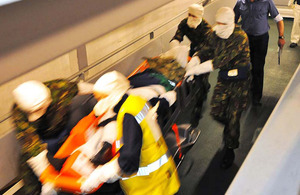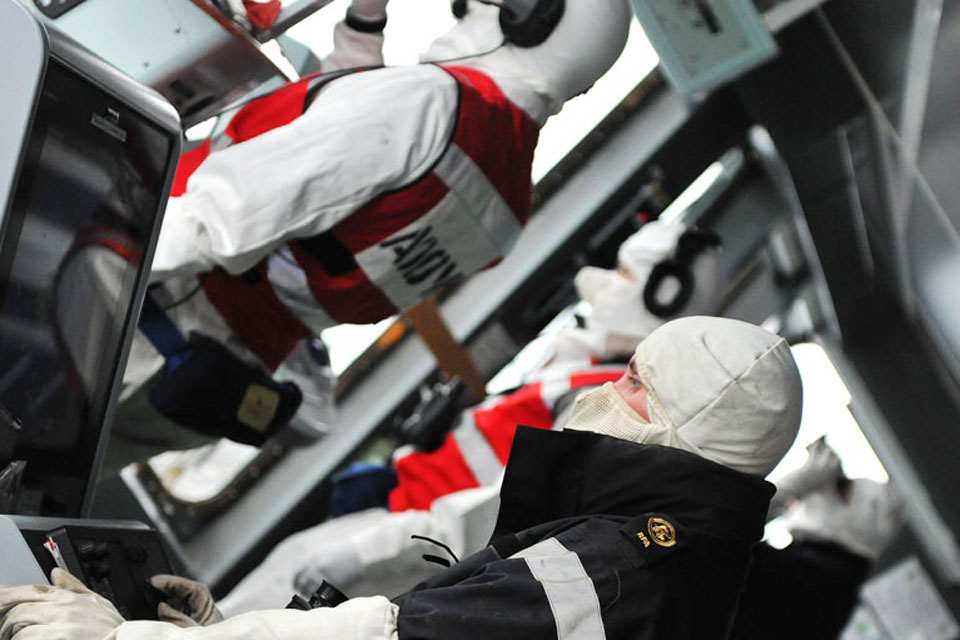Navy medics in major exercise at sea
150 Royal Navy personnel have been taking part in a major medical exercise off the UK's south west coast on board Royal Fleet Auxiliary (RFA) vessel Argus.

A mock casualty is transported at speed through RFA Argus by a stretcher team [Picture: Leading Airman (Photographer) Rob Gillies, Crown Copyright/MOD 2012]
Wearing white anti-flash overalls and face masks, as if at war, the hospital unit and crew of the ship rehearsed taking on board and treating casualties of bombs and enemy fire.
Exercise Medical Endeavour 2012 sees Argus operating in her main role as the Royal Navy’s primary casualty-receiving ship. The training involves a series of exercises on board Argus where casualties airlifted to the ship are taken to a hospital like that in Camp Bastion, Afghanistan, which has similarities to an acute district general hospital.
Using skills honed in Iraq and especially Afghanistan the exercise also sees the doctors and nurses and stretcher-bearers from the Band of Her Majesty’s Royal Marines Scotland put on a war-footing for 24-hour days while air and warship attacks are simulated and battle-wounded casualties taken on board from ashore and within the ship.
The exercise graphically demonstrates to primarily naval personnel, but also airmen and soldiers, that giving top-level medical care to severely ill patients with burns, smoke inhalation, head injuries and blast and firearm injuries at sea is a far cry from working in Plymouth’s Defence Hospital Unit at the Derriford NHS Hospital, let alone the battlefield hospital at Camp Bastion.

RFA Argus's bridge at action stations during Exercise Medical Endeavour 2012 [Picture: Leading Airman (Photographer) Rob Gillies, Crown Copyright/MOD 2012]
At action stations in between missile and torpedo attack alerts, heralding more casualties, the head of the Royal Naval Medical Service, Surgeon Commodore Andrew Hughes, said:
It is vital we do this training together, even if it is only once a year. It is especially difficult to get everyone together with personnel from across the Service serving in Afghanistan. But it is essential if we are to remain at the top of our game clinically.
He explained that the challenges of running a floating hospital based on consultant-led care are numerous and range from the basics of learning your way round a ship, dealing with sea-sickness, and training in dealing with battle-damage, to evacuating a ship’s hospital on a sinking ship and dealing with panicking casualties in pain on a shifting ward, or conducting life-saving surgery in a moving operating theatre.
Surgeon Captain David Lunn, operational clinical director on board, said:
The challenge is to maintain the highest clinical standards wherever we are sent in the world at sea in the face of fires and floods. It is also hard to focus minds on looking after themselves, on force protection, because they are so used to putting patients first in the normal hospital environment, but at sea that is an important element.
Here on board such multi-tasking is essential and naval personnel are used to it if they have been to sea regularly.
Many of the medical personnel embarked on RFA Argus for the exercise have only just returned from Afghanistan as Royal Naval Medical Service personnel have been providing all the medical support on Operation HERRICK 14. Their ability to adapt and work in a variety of different environments only serves to demonstrate their versatility and continued utility to Defence.
The medical complex within Argus is a fully-equipped 100-bed hospital facility, including a four-bay operating theatre, together with a 10-bed intensive care unit, 20-bed high dependency unit, two 35-bed general wards and the full range of clinical support services, including imaging, pathology, pharmacy and physiotherapy.
In the intensive care ward, heading her team is Chief Petty Officer Nicola Leftley from Derriford Hospital. She said her time in Afghanistan had given her experience of trauma care in a combat hospital which was now being put to use at sea. She said the major differences were having to ensure the smallest items were not left to fall to the floor on a rocking ship in rough weather and having to deal with a flood that was unlikely in a land hospital, all adding to multi-tasking duties and stress while treating severely ill casualties.
Commander Stuart Dickson heads the intensive care unit. He said the hospital’s ability to conduct emergency surgery while under attack was limited and operations might have to be delayed until it was deemed safe to perform them. He said the military/NHS partnership benefited both organisations:
This model of consultant-led care has been proven in Iraq and Afghanistan and is benefiting NHS trauma care where we also work. We have consultants always at hand instead of going through junior doctors. We know what sort of injuries to expect in battle situations and are saving lives that would have been lost a few years ago.
A wide variety of expertise is embarked, including consultants, nurses and allied health professionals covering the full spectrum of clinical capability: emergency medicine, general surgery, trauma and orthopaedics, burns and plastics, anaesthetics, general medicine, psychiatry, radiology, pathology, general practice, dental, and intensive care. And there are also operating theatre practitioners, physiotherapists and pharmacists.
Commander Neil Wagstaff, commanding officer of the medical unit within the ship, said:
The primary casualty-receiving facility delivers deployed hospital care to members of the UK Armed Forces, from the sea. The primary casualty-receiving facility aims to deliver outcomes of treatment which equate to best practice and evidence-based medicine, offering the highest level of care to deployed Service personnel.
The principal objective of Exercise Medical Endeavour 2012 is to ensure that the casualty-receiving facility can deliver first-rate healthcare to those deployed on future operations.
The Commanding Officer of RFA Argus, Captain Ian Johnson, said:
This is an excellent opportunity for the ship to exercise its primary role. We are proud to be the Royal Navy’s primary casualty-receiving ship and this exercise will reinforce the enhanced capability of this unique facility.